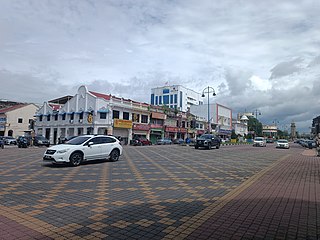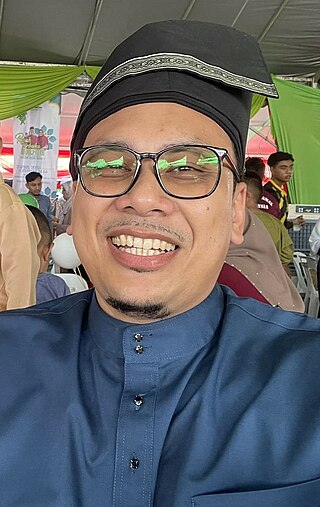
Kedah, also known by its honorific Darul Aman and historically as Queda, is a state of Malaysia, located in the northwestern part of Peninsular Malaysia. The state covers a total area of over 9,000 km2, and consists of a mainland portion and the Langkawi islands. The mainland has relatively flat terrain, which is used to grow rice, while Langkawi is composed of mostly of uninhabited islands.

Hussein Onn was a Malaysian lawyer and politician who served as the third Prime Minister of Malaysia from the death of his predecessor Abdul Razak Hussein in 1976 to his retirement in 1981. Moreover, he was the Member of Parliament (MP) for Sri Gading from 1974 to 1981, representing Barisan Nasional (BN) and United Malays National Organisation (UMNO). He was granted the soubriquet Father of Unity.

Sultan Hisamuddin Alam Shah Al-Haj Ibni Almarhum Sultan Alaeddin Sulaiman Shah was Sultan of Selangor from 1938 to 1942, later from 1945, and the second Yang di-Pertuan Agong of the Federation of Malaya from 14 April, until his death on 1 September 1960.

Sungai Petani is a town in Kuala Muda District, Kedah, Malaysia. Sungai Petani is Kedah's largest city and is located about 55 km south of Alor Setar, the capital of Kedah, and 33 km northeast of George Town, the capital city of the neighbouring state of Penang.

Banting is a town and the seat of Kuala Langat District, Selangor, Malaysia. Banting has a population of 93,497. The postal code for Banting is 42700 and is administered by the Zone of 15 and 19 of the Kuala Langat Municipal Council. It is situated on the banks of Langat River. It is a Rest Town or Bandar Persinggahan of Federal Route 5. The historical Jugra, a former royal town of Selangor is situated near Banting. Banting is located near the beaches of Morib, as well as hills, forest and farms. Banting is an agricultural hub. Its main agricultural resources include oil palm plantations, poultry farms, betel leaves and it has a number of industrial areas. It is also the home town of the Malaysian badminton player Rashid Sidek.

University of Putra Malaysia, abbreviated as UPM, is a Malaysian public research university located in Serdang, Selangor. Formerly it was named Universiti Pertanian Malaysia, focusing on agricultural sciences and related fields. Since the 1990s, the fields of study have expanded to include human ecology, languages, architecture, medicine, computer science and biotechnology. Currently there are 15 faculties, 11 institutes and 2 schools covering these as well as agriculture, forestry, veterinary medicine, economics, engineering, sciences, and education.

The Rejimen Askar Wataniah is the military reserve force of the Malaysian Army.
This article lists important figures and events in Malayan public affairs during the year 1955, as well as births and deaths of significant Malayans.

Ibrahim Secondary School is a morning session National Secondary School (SMK) in Sungai Petani, Kedah, Malaysia. It is a co-education school which offers education level from Form 1 to Form 5 and as well as Form 6. It also provides dormitory for students who wish to reside at the school's dormitory. Students of the school are commonly referred as Ibrahimians.

Ungku Abdul Aziz bin Ungku Abdul Hamid was a Malaysian economist and university professor. He was the 3rd Vice-Chancellor of the University of Malaya from 1968 to 1988 and the 1st General Director of the Council on Language and Literature of Malaysia from 1956 until 1957. He was the first to be awarded the title of Royal Professor in 1978.
This article lists important figures and events in Malayan public affairs during the year 1950, together with births and deaths of significant Malayans.

Universiti Sultan Zainal Abidin is the 18th public institution of higher learning, located in the state of Terengganu, Malaysia. The university is a creature of the Act of Parliament known as the Universities and University Colleges Act 1971, with its constitution laid down under the Universities and University Colleges (Universiti Sultan Zainal Abidin) Order 2010. It is the first full-fledged university in the east coast of Peninsular Malaysia and the first university to be based on the “cluster” concept. It is also the first university in Malaysia to be modelled after University of London, United Kingdom.
Tan Sri Zainal Abidin bin Ahmad or better known by the moniker Za'aba, was a Malaysian writer and linguist. He modernised the Malay language with the publication of a series of grammar books entitled Pelita Bahasa in 1936 at the Sultan Idris Training College. The book contained guidelines in modernising the structure of classical Malay, transforming it into the language that is in use today: the most significant change was the switch from the conventional passive to the modern active form of syntax.

Sekolah Berasrama Penuh (SBP) or Fully Residential School is a school system established in Malaysia to nurture outstanding students to excel in academics and extracurricular activities. Since 2008, SBPs are directly administered by Fully Residential and Excellent Schools Management Division, Ministry of Education.
Haron bin Din was a Malaysian politician and Muslim cleric. He was the 3rd Spiritual Leader of the Malaysian Islamic Party (PAS) from March 2015 after the death of his influential predecessor Nik Abdul Aziz Nik Mat to his own death in 16 September 2016.
Kolej Islam Sultan Alam Shah is an Islamic boarding school in Klang, Selangor. Initially named as Kolej Islam Malaya, it is the first institution for Islamic higher education in Malaya

Abdul Aziz bin Juned is a Bruneian aristocrat, politician and muslim scholar who is the current Grand Mufti of Brunei. As a Grand Mufti, he is the most senior and most influential Sunni Muslim religious and legal authority in the nation. He was appointed by the Sultan in 1994.
The following is an alphabetical list of articles related to Selangor.

Afnan Hamimi bin Taib Azamudden is a Malaysian politician who has served as the Member of Parliament (MP) for Alor Setar since November 2022. He is the first Alor Setar MP of Malay ethnicity. He is a member of Malaysian Islamic Party (PAS), a component party of the Perikatan Nasional (PN) coalition. He has also served as the Youth Chief of PN since January 2024 and of PAS since October 2023.

Yahya bin Haji Ibrahim, pen name Yahya M.S., was a Bruneian aristocrat, poet and politician who served as the Deputy Minister of Religious Affairs from 1986 to 2005, and the Chief Syar’ie Judge. He had a career in the government service of Brunei, in which he held a number of important positions such as being a member of the Privy Council of Brunei. Additionally, he was considered one of the first to write Islamic poetry in the country.













